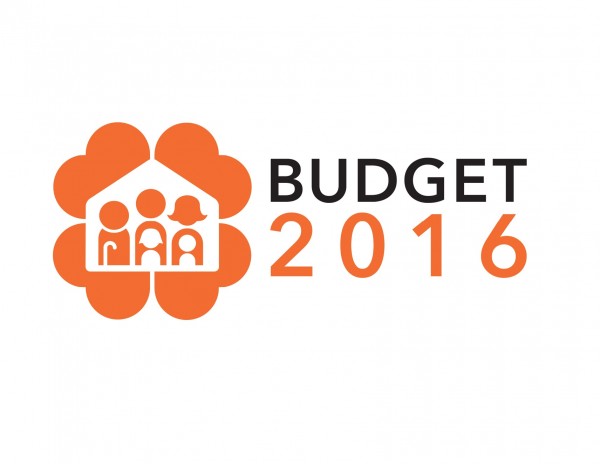-
Advocacy Theme
-
Tags
- Abortion
- Adoption
- Caregiving
- CEDAW
- Disability
- Domestic Violence
- Domestic Workers
- Harassment
- Healthcare
- Housing
- International/Regional Work
- Maintenance
- Media
- Migrant Spouses
- Migrant Workers
- Muslim Law
- National budget
- Parental Leave
- Parenthood
- Polygamy
- Population
- Race and religion
- Sexual Violence
- Sexuality Education
- Single Parents
- Social Support
- Sterilisation
- Women's Charter
AWARE responds to Budget 2016 speech
March 25th, 2016 | Family and Divorce, News, Poverty and Inequality, Press Release, Views
This post was originally published as a press release on 24 March 2016.
AWARE found 2016 Budget limited and tentative in moves to a more “caring and resilient society”
 This afternoon’s Budget speech by Minister of Finance Heng Swee Keat took limited, tentative steps to a more “caring and resilient society”, but missed an opportunity to be bolder and more robust in supporting care and promoting equality, said the Association of Women for Action and Research (AWARE).
This afternoon’s Budget speech by Minister of Finance Heng Swee Keat took limited, tentative steps to a more “caring and resilient society”, but missed an opportunity to be bolder and more robust in supporting care and promoting equality, said the Association of Women for Action and Research (AWARE).
“Singapore urgently needs to prioritise investment in care infrastructure, instead of relying on unpaid female family members leaving the workforce,” said Dr Vivienne Wee, Research & Advocacy Director at AWARE. “Disappointingly, the Minister did not address this, even though care support allowing women to return to work would alleviate the labour shortage that he mentioned a few times.”
Caring for an ageing population – and its impact on women – was the key theme in AWARE’s 2016 Budget recommendations, submitted via REACH on 26 February this year. In it, AWARE pointed out that efforts to encourage women to rejoin the workforce through retraining schemes “will not succeed without adequate care provision or employment conditions that enable individuals to combine paid work with home care”.
“The focus in this year’s Budget on skills acquisition and lifelong learning unfortunately continues to overlook this vital point,” said Dr Wee.
Is Silver Support living up to its potential?
The announcement of Silver Support in the 2015 Budget drew strong support from AWARE, with its promise as a person-centric approach with automatic assessments of eligibility rather than a complex application process. As women who leave or cut back on employment due to family responsibilities often face financial inadequacy on retirement, the scheme has the potential to be particularly helpful to older women.
“Lifetime earnings should be the primary criterion – less weight should be given to the other factors,” said Jolene Tan, Programmes & Communications Senior Manager at AWARE. “A senior citizen may not be able to access the value of housing owned or income earned by family members. But housing type seems heavily determinative of the level of Silver Support available, which means older people’s needs still risk going unmet.”
Single parents – will the First Step grant apply to them?
AWARE also seeks clarification on the newly announced Child Development Account (CDA) First Step grant. The Budget speech and media releases refer to “all” Singapore citizen babies, but marriage of the parents has ordinarily been one of the eligibility criteria for CDAs.
“Policies should not disadvantage children from birth based on their parents’ marital status,” said Jolene Tan, Programmes & Communications Senior Manager at AWARE. “We hope this measure is inclusive toward single parents, and if so, we strongly urge the Ministry to make this clear.”
“Last July, the Minister for Social and Family Development mentioned a review of the inequalities in policies toward single parents,” Jolene Tan added. “A Budget about a ‘caring and resilient’ society would have been a good place to announce, more concretely, what that will mean.”
Fresh Start may not be responsive to needs of the poor
The Minister for Finance also stated that grants of up to $35,000 will be available to families under the Fresh Start Housing Scheme. AWARE has previously raised concerns about the limitations of the approach of Fresh Start, including through a letter sent directly to the Prime Minister, Minister for National Development and the Coordinating Ministers in February. No reply has yet been received.
“The concern with promoting social mobility and housing security is very welcome,” said Jolene Tan, Programmes and Communications Senior Manager at AWARE. “But the focus on home ownership may miss the more urgent problem – namely that after divorce, restrictions on rental access impoverish families because they are forced to rent on the open market. Rather than later assisting with home ownership, what we need is upstream intervention to prevent families from becoming poor at this initial stage.”
Recommendations that we have made for the national Budget in recent years can be found on our website: 2015, 2014, 2013



